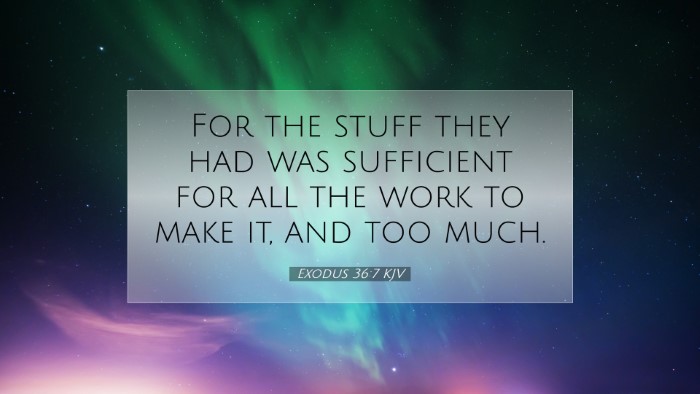Commentary on Exodus 36:7
Verse: "For he had the resources for all the work to be done, according to all the work that they were to do. And Moses commanded that they be brought in, and they had resources enough, and more than enough."
Introduction
Exodus 36:7 is a crucial passage in the narrative of the construction of the Tabernacle, showcasing the overwhelming generosity of the people of Israel in response to God’s command. This commentary synthesizes thoughts from esteemed public domain theologians like Matthew Henry, Albert Barnes, and Adam Clarke, providing a profound examination of the implications and lessons drawn from this verse for today's readers.
Theological Significance
This verse highlights God's providence and the concept of stewardship among His people. The Israelites, having been redeemed from slavery, demonstrate a transformed heart attitude towards giving. Matthew Henry emphasizes that the contributions were not coerced; instead, they were voluntary and given out of joy and devotion to God. This establishes a biblical precedent for giving; it must originate from a heart filled with gratitude and reverence.
The Generosity of the People
Albert Barnes notes that the offerings surpassed what was needed for the construction, declaring that the willingness of the people exceeded the requirements. This excess reflects a powerful principle of divine provision; God supplies abundant resources for His work through His people. It serves as a reminder that God often provides more than is necessary to accomplish His purposes.
Leadership and Direction
From Adam Clarke's perspective, the role of Moses in this narrative is pivotal. He commands that the surplus materials be received, demonstrating effective leadership. Moses’ instructions showcase the importance of guidance in the Christian community. Leaders must recognize and channel the passions and gifts of their congregations to achieve God’s call effectively.
Practical Applications
This verse invites a contemplation of several practical applications for individuals and church leadership:
- Stewardship: The verse emphasizes the role of stewardship in the life of believers. All resources belong to God, and His people are to manage these resources wisely and generously.
- Community Involvement: It encourages the church to foster an environment where community members feel led to contribute and give. The church's mission often depends on its members actively participating in the work of God.
- Willingness to Give: It challenges believers to reflect on their attitudes toward giving. Are they generous in their contributions, and are they giving out of joy or obligation?
The Nature of God’s Provision
The verse illustrates that where God directs, He also provides. The abundance of materials signifies that God equips those whom He calls. Matthew Henry points out that this principle can be applied to all aspects of ministry; God will not call individuals to a task without also granting them the necessary means to fulfill it. This aspect of divine providence should be a source of encouragement for pastors and ministry leaders as they step out in faith.
Conclusion
Exodus 36:7 is not only a historical account of the construction of the Tabernacle but also a profound lesson about giving, leadership, and God's provision. Through the collaborative effort of the Israelites led by Moses, we learn about the significance of community, the blessing of generous contributions, and the great faithfulness of God who provides for His work. Pastors, students, and scholars can derive deep insights from this simple yet powerful verse, applying its truths to contemporary situations in the church and beyond.


